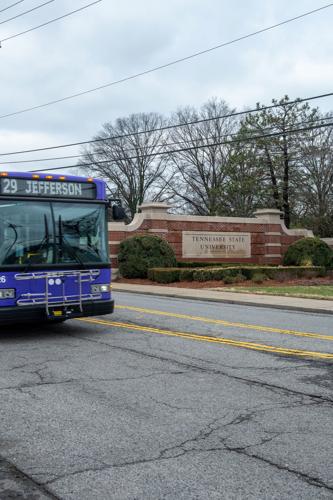
This article is part of a three-piece cover story examining TSU. Read the rest here.
Rep. Harold Love Jr. began looking into the possibility that the state was underfunding Tennessee State University in 2013. But the Nashville Democrat was following in his father’s footsteps — Harold Love Sr. began examining the same thing in 1970.
“It’s my blood,” says Love Jr. of the university.
The younger Love received his bachelor’s and doctoral degrees from TSU, where his mother worked for 57 years. His father also served in the state House — both men served in districts home to the university.
“These were conversations we would have at home, just about the university and the work he was doing — the path to eradicating the underfunding,” says Love, whose father died in 1996. “And so for me, getting elected in 2012 and sworn in 2013, to have the conversation about underfunding still being a concern was shocking. But that’s when we began the work of investigating what we call the state match requirements.”
TSU is what’s known as an 1890 land-grant institution — a historically Black school that was established by the Morrill Act of 1890. There are federal laws about its level of state funding compared to its counterpart — the University of Tennessee, Knoxville, established by the Morrill Act of 1862.

Harold Love Jr.
“The loophole with 1890 Morrill Act schools was that if the state government didn’t have the funds to provide a full match, then the states could request a waiver of the full match requirement,” says Love. “The waiver could be no more than 50 percent of what was required. So that, I think, began the opening of opportunities, I’ll say, for underfunding.
“The other nuance is, in some states, the legislature just said to the schools, ‘We don’t have any of it, even the waiver, so you may have to let go of those federal funds,’” Love continues. “So what presidents oftentimes did was raise their own funds to make the match. And so when we talk about underfunding, it’s a double whammy.”
Historically, he explains, those university presidents were not only missing out on the state funds — universities were also pulling money from their own reserves. By now, the numbers are widely known. Thanks to a committee that Love pushed for, a 2021 study revealed that the state of Tennessee underfunded TSU by more than $544 million between 1957 and 2007, based on those matching rules. In 2023, the U.S. Department of Education found the state underfunded the university by $2.1 billion. (The latter number is based on a totally different funding requirement.)
Move comes as comptroller's office issues audit reports including findings from 2019
As Love was working on addressing the underfunding issue, TSU was undergoing a massive enrollment increase — and trouble arose with housing. At the same time, then-president Glenda Glover and other members of school leadership were pushing hard for the state to pay TSU in response to its historic underfunding.
The state did take a first step, agreeing to provide TSU with $250 million for building maintenance to address a backlog of infrastructure plans. Another $250 million was to be granted to the school later for academic programs — however, the university has yet to fully draw down the funds for the infrastructure projects. Love has a plan to propose some changes to get TSU its funding. As the state opened up this funding to the university, state leaders were also watching several audits reveal how management of school funds became an issue.
“There are many of us who are aware of the challenges that the underfunding has caused,” Love says. “We are not abandoning the work to get underfunding resolved. And we also think there’s an obligation to the students that we also make sure that Tennessee State has these systems in place to provide them the world-class education the school can.”
In an audit of the entire state for the fiscal year ending June 2023, the state comptroller’s office found that TSU did not follow federal guidance for money from the Coronavirus Aid, Relief, and Economic Security Act (CARES), which created the Higher Education Emergency Relief Fund (HEERF). Federal regulations stated that additional scholarships and grants to students that utilized HEERF money should prioritize students with exceptional needs. TSU spent $85,000 of those funds on grants that were given based on requirements such as GPA and attendance at student engagement events. The university could be required to pay that money back to the U.S. Department of Education.
Additionally, at the beginning of fiscal year 2023, TSU did not have HEERF funds remaining, but $233,133 became available after late adjustments to student accounts. The state audit questions the spending “after the prior-year costs were reversed and then again spent in a similar fashion.” The audit goes on to say that TSU management and auditors were unable to determine whether funds were used appropriately. TSU management did not concur with the audit findings, but school leadership did indicate that they would develop a system for the future.
Ultimately, these financial management issues were the reason for the state’s ire as Glover retired and Republican state leaders passed legislation to vacate the school’s board of trustees.
“At the end of the day, several things can be true,” Love says. “There can be some areas in the university that need to be improved — and they do, and they’re being improved now. Also the state can owe the university money. They’re not exclusive of each other.”
After the new board was appointed and interim president Ronald Johnson was chosen, the university reported on its financial challenges to the State Building Commission in November. At that meeting, comptroller of the treasury Jason Mumpower made a suggestion to sell the university’s Avon Williams Campus for a cash infusion and indicated he knew of several developers who were interested. Love explains that the school’s downtown satellite campus is not just a building or property, but a space with a history that must be considered.
Glover's announcement follows a critical report regarding financial issues at the school
“When you talk about the Avon Williams Campus, you talk about [civil rights pioneer and TSU professor] Rita Sanders Geier, who then is realizing that there’s a dual system of higher education in the state of Tennessee,” Love says. “Out of that came the acquisition of UT Nashville by Tennessee State … and TSU getting the downtown campus property.”
That November meeting was heated, as the commission also discussed an advisory contract that the university had to pay the now-retired Glover. By the next meeting, in December, Johnson had resigned and the new interim president Dwayne Tucker was installed.
The commissioners urged Johnson, and later Tucker, to have the board of trustees consider financial exigency. Essentially, exigency is a formal declaration by the Tennessee Board of Regents — the governing board of public colleges and universities in the state — that TSU faces an imminent financial crisis that creates an inability to maintain programs, and the only way for the budget to be balanced is by extraordinary means. In a special-called meeting, the TSU board had an informational session to learn about financial exigency.
“The bottom line is financial exigency is an important mechanism for restoring an institution’s financial stability in the face of a serious, sustained crisis,” Deanna McCormick, a higher education consultant, said during her presentation to the board. “But it should be avoided as a unilateral or quick fix to a temporary condition.”
Ultimately, according to TSU policy, the president has the responsibility to initiate a proposal for declaration of financial exigency with the Tennessee Board of Regents. Several other steps must be taken before that can happen. The board’s next regular scheduled meeting is March 14. Tucker was set to give another presentation on the university’s financial situation to the State Building Commission at its meeting on Feb. 19 (after the Scene’s deadline).
Amid the historic local university’s financial turmoil, we examine the school’s past and future









